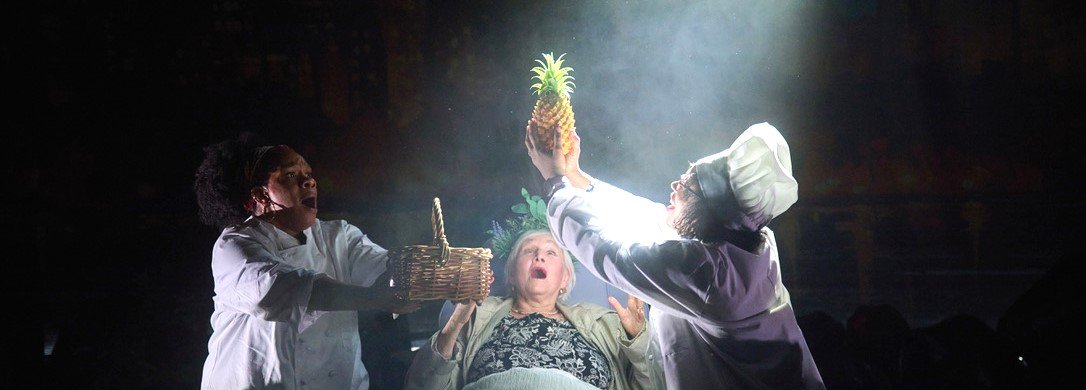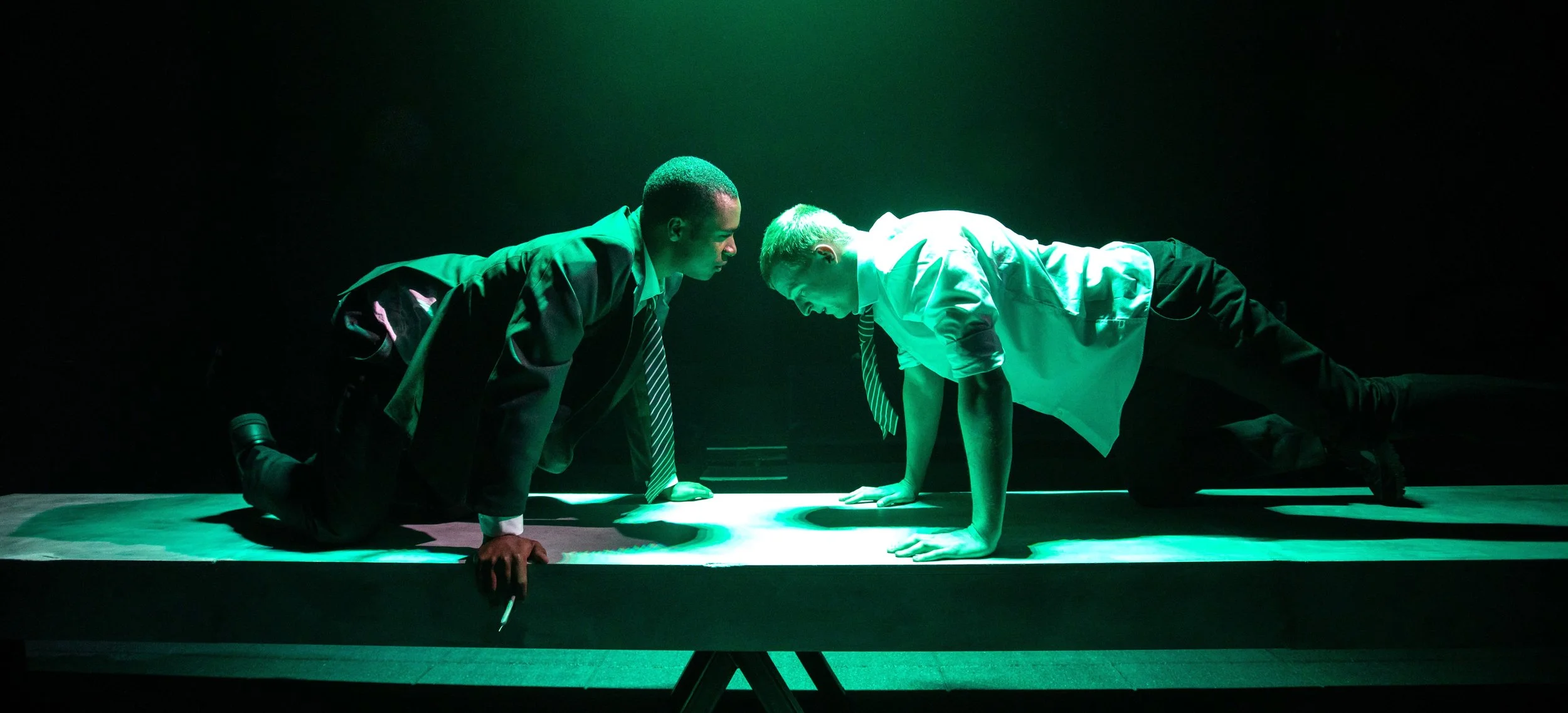The personal is political. This familiar adage is one of the points Deb Margolin makes in the awkwardly staged and often pretentious-sounding play This Is Not a Time of Peace. Other points: History repeats itself. We are the sum total of everything we’ve experienced. Beware despots. Professional ambition can clash with personal ethics. Time does not heal everything. Trumpism equals McCarthyism.
Warrior Sisters of Wu
The Qiao sisters, Qing and Wan, have not been well known outside Chinese history. They first appeared as minor characters in the 14th-century Chinese novel, Romance of the Three Kingdoms. Since then, they have turned up as supporting characters in the Chinese opera Fenghuang Er Qiao and, most recently, as protagonists of movies like John Woo’s Red Cliff (2008) and the video game Dynasty Warriors. For Warrior Sisters of Wu, Damon Chu draws on their shared mythology but also on Much Ado About Nothing and Pride and Prejudice. While Chua’s writing doesn’t reach the literary heights of Shakespeare or Austen, his acknowledgment of the rich cultural heritage and archetypes ranging from ancient China to 19th-century England root Warrior Sisters in dramatic material that promises the best that hundreds of years of storytelling have to offer.
Sunset Baby
Sunset Baby begins with Kenyatta (Russell Hornsby), a legend of the Black Liberation Movement who has spent time in prison for robbing an armored truck, speaking hesitantly into a camcorder—the video feed is projected above the stage—about the uncertainties of fatherhood: “Fatherhood. Complex. Complicated. An abstract concept. Not clearly definable.” Just how complicated it is in his particular case is soon revealed when he tries to reunite with his estranged daughter, Nina (Moses Ingram), a woman who has built a hard, protective shell around herself and does not want to hear a whiff of nostalgia from a man she barely knows. She doesn’t even want Kenyatta to say her name: “Do not say my name as if you’ve said it a hundred times. As if we have this familiarity between us. We are not familiar. We are not close.”
Where Women Go
Theatergoers who have followed the career of the late Tina Howe now have an opportunity to see her final work, Where Women Go, a triptych of one-acts that invites one on an absurdist journey through New York City. Directed by Aimée Hayes, this intimate work has some transcendent moments, but its poetic flights are too often thwarted by its gimmick-driven scenarios.
The Christine Jorgensen Show
Much of the audience at The Christine Jorgensen Show seemed to be, as the phrase goes, of a certain age, and maybe that’s understandable. Who under 60 knows who Christine Jorgensen was? Yet for a time in the 1950s she was, as a character says in Donald Steven Olson’s play with music, “one of the most famous human beings in the world.”
On Set with Theda Bara
On Set with Theda Bara is a single-actor comedy-drama by Joey Merlo that revolves around the suspicious disappearance of a genderqueer teenager. In this pastiche of film noir, Merlo piles mystery upon outlandish mystery, and David Greenspan leads the spectators (limited to 50 a performance) through a 65-minute, mazelike tale that’s at once intriguing and mystifying.
Munich Medea: Happy Family
A program note by Corinne Jaber, the playwright who is making her debut with Munich Medea: Happy Family, says that her work is meant to “shine light into places that are difficult to look at” and not “judge nor accuse, but to reveal.” She accomplishes that, but the story line of her fairly static, albeit well-cast, play feels like one we’ve (unfortunately) seen before. At this point, more than 25 years after How I Learned to Drive won the Pulitzer Prize, sexual abuse is no longer a novel subject for the stage.
The Apiary
A dystopian story about environmental catastrophe and death is not necessarily where one would expect to find humor, but Kate Douglas achieves a darkly comic triumph with her new play, The Apiary. The production at Second Stage Theater fires on all cylinders, including Kate Whoriskey’s superb direction and the uniformly stellar cast, who navigate the play’s mixture of absurdity and sincerity with precise and convincing performances.
Russian Troll Farm
Sarah Gancher’s Russian Troll Farm at the Vineyard Theatre is a nightmare version of an office sitcom, set during the run-up to the 2016 U.S. election. Quirky worker bees perform evil tasks while navigating interpersonal relationships and an ever-present authoritarian state looming over them, in the form of Vladimir Putin’s portrait on the wall and an armed soldier keeping watch. The professional Internet trolls in St. Petersburg, at the benignly named Internet Research Agency, send out vast numbers of tweets and posts using fake accounts—a “mix of celebrities, eggs, fake individuals, and pundits”—to disseminate misinformation. In almost every case, Gancher uses real Russian troll tweets, a documentary reality that makes the set-up even more nightmarish.
White Rose: The Musical
Those reflecting on history often use a wide brush and focus on major figures to the exclusion of perhaps less renowned but significant players. Hitler, the Nazi war machine, and concentration camps are front of mind as regards World War II in Europe, but how many people remember dissidents and resistance from within Germany? The White Rose, one such resistance group, presented a credible threat to Nazi lies, propaganda, and blind devotion to the Führer. Brian Belding’s White Rose: The Musical is an homage to some of those “good Germans” who risked their lives and paid the ultimate price for defying Hitler and his henchmen.
The Animal Kingdom
There are few theatrical experiences more thrilling than witnessing a new play catch fire and mesmerize an audience. That experience is now to be had at the Connelly Theater Upstairs, where British playwright Ruby Thomas’s airtight 80-minute drama, The Animal Kingdom, is making its U.S. premiere. Tautly directed by Jack Serio, it’s a show that is emotionally gripping and ultimately redemptive.
Public Obscenities
Shayok Misha Chowdhury's semi-autobiographical Public Obscenities returns to the stage this season at Theatre for a New Audience as part of The Under the Radar Festival. The production explores themes of returning home and complex relationships as a queer Indian man tries to come to terms with his family’s secrets while breaking away from learned behavior.
Jonah
The main character in Rachel Bonds’ new drama Jonah is not Jonah but Ana, a young woman portrayed from age 16 into her 30s by Gabby Beans, who’s on stage for the entire play. Jonah (Hagan Oliveras) is in only the first third, except for a brief reappearance near the end. The play peaks during those early scenes, which are charming and funny, then gets increasingly talky and disturbing in the post-Jonah scenes.
Aristocrats
Brian Friel’s Aristocrats is often described as “Chekhovian,” and, indeed, the parallels to The Cherry Orchard and Three Sisters are unmistakable: three very different sisters of the O’Donnell family, along with their relations and hangers-on, navigate a collapsing estate, literally and figuratively, and grapple with a questionable family legacy and sense of purpose. Aristocrats is the second installment of the Irish Rep’s Friel Project, following an exquisite production of Translations.
Our Class
On July 10, 1941, as many as 1,600 Jewish men, women, and children were rounded up and packed into a barn in Jedwabne, a small town in northwest Poland. The locked barn was set ablaze, and everyone inside perished. The pogrom is notable (and controversial) because, unlike similar atrocities in Nazi-occupied cities and villages, the massacre was not carried out solely by officers of the Third Reich or by Soviet nationals. The perpetrators were friends, associates, and neighbors of the Jews with whom they had lived peaceably and side-by-side before the occupation. Although not explicitly about Jedwabne, Tadeusz Słobodzianek’s Our Class follows the basic outlines of the historical events, and under Igor Golyak’s resourceful and potent direction, the play shows that our most barbarous enemies may indeed dwell among us.
Bacon
The journey from boy to manhood is fraught with dangers. A superb new play, Sophie Swithinbank’s Bacon, underscores this reality as she dramatizes the passage of two teens into adulthood. Directed by Matthew Iliffe, Bacon is both a cautionary tale and an unflinching exploration of masculinity, sexuality, and power. A sold-out production at the 2023 Edinburgh Festival Fringe, it is now part of the International Fringe Encore Series at the SoHo Playhouse.
The Night of the Iguana
Tennessee Williams’s The Night of the Iguana is often considered his last great play, but the 1961 milestone was created amid stress and anguish. The role of Hannah Jelkes was written for Katharine Hepburn, but Spencer Tracy needed her care; Margaret Leighton played it and won a Tony. Bette Davis, difficult to imagine as the sensual Maxine Faulk, was at her most tyrannical during tryouts; she left the production after three months. Elia Kazan didn’t direct, though he lauded the work of Frank Corsaro, who did. In the end, however, the play survived, but La Femme Theatre Productions’ revival, the first in 28 years, demonstrates that pitfalls abound.
Death, Let Me Do My Show
A specter is haunting Rachel Bloom—the specter of death. In fact, Death is sitting in the fifth row of her show, Death, Let Me Do My Show, looking suspiciously like Bloom’s friend David Hull, the “moderately successful actor who seems stuck between leading man and character roles” (as she describes him). And Death insists on being acknowledged, contrary to Bloom’s plan to deliver the show as she conceived it in 2019.
Export Quality
Export Quality, a play centered on the mail-order bride system in the Philippines—a practice that usually leads to the trafficking, rape, abuse and death of many women by American men. Although the mail-order bride industry has existed for decades, Export Quality is a reminder to the public that this issue persists. The four main characters who introduce themselves at the outset are commodified and stripped of their fundamental human rights—sentenced to a life of indentured servitude.
Unconfined
Unconfined is a solo theater piece based on real-life events that asks a fundamental question: What does it mean to really know another person? In this case, the question is more difficult than usual, as the person to get to know is on lockdown on death row. The story of a seemingly kind, thoughtful, creative, and spiritually sophisticated convicted murderer came to playwright Liz Richardson’s attention when she “received a binder of extraordinary poems, drawings, and letters by a prisoner who had been on death row for 18 years,” as noted in the program. She wrote the piece based on her own research and interviews. Richardson portrays three characters who all interacted with the unseen, unnamed protagonist while he was imprisoned: Barbara, a professor of comparative religion at a Southern university; Eleanor, an English artist; and a fellow death-row inmate, Benny.


























